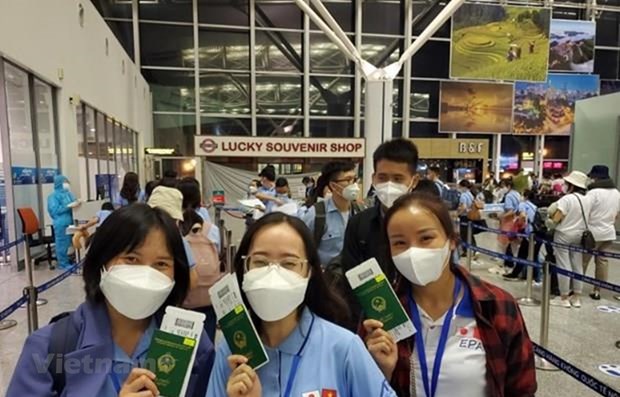Good signs for sending labourers to work abroad in 2022
The Ministry of Labour, Invalids and Social Affairs (MoLISA) will focus on completing and promoting the signing of new labour cooperation agreements, especially with priority given to markets with high and stable income.
 Illustrative image (Photo: VietnamPlus)
Illustrative image (Photo: VietnamPlus)The labour export has been one of the sectors hardest hit by the COVID-19 pandemic in the last two years. The number of workers going to work abroad in 2021 decreased to nearly a third of what it was before the pandemic.
However, with efforts to control the pandemic and more and more cooperation agreements on labour being signed, the sending of workers abroad in 2022 is expected to improve.
Waiting for nearly two years, Ban Van Quyen in Cao Bang province still hopes to go to work in Japan. His flight schedule has been delayed since the outbreak of COVID-19 in April 2020.
Due to the complicated development of the pandemic, Quyen’s plan was postponed many times.
Quyen said during the waiting time, he went through many jobs from working as a restaurant waiter, seasonal worker, security guard, and technology-based motorbike driver.
“I mainly chose seasonal jobs to wait for the opportunity to go to work in Japan.” he said.
Quyen's hope is probably the mood of tens of thousands of workers who are waiting for working abroad in 2022.
Although the MoLISA worked hard to seek new labour markets, the number of workers going to work abroad in 2021 still remained limited due to the impact of the COVID-19 pandemic.
Director of the MoLISA's Department of Overseas Labour Tong Hai Nam said that the sending of workers abroad continues to face many difficulties and challenges due to the outbreak of the COVID-19 pandemic in key countries and territories that receive Vietnamese workers.
Before the pandemic, Vietnam sent between 130,000 - 140,000 labourers to work abroad per year, but in the last two years, the number decreased rapidly, especially in 2021, Nam said.
According to data of the Department of Overseas Labour, the total number of Vietnamese workers sent to work abroad in 2021 was 45,058, reaching only half of the set plan, and equal to 57.29% of the number in 2020.
Taiwan (China) and Japan were the two main markets receiving Vietnamese guest workers in 2021. Notably, some potential markets recruiting more Vietnamese workers were Romania, Singapore, Hungary and Serbia.
Last year, the MoLISA renewed the Memorandum of Understanding (MoU) on sending labourers to work in the Republic of Korea (RoK) under the Employment Permit System (EPS) programme; agreed on the content of the extension of the MoU with Malaysia on labour recruitment; kicked off negotiations with Israel over an agreement on fixed-term labour; and drafted an agreement on labour recruitment with Thailand.
Towards developing high-income labour markets
Opportunities for Vietnamese labourers to work abroad are gradually opening up in the early days of 2022.
The RoK, one of the markets receiving a large number of Vietnamese workers, has just announced that it will receive 59,000 Vietnamese guest workers in 2022 under the EPS programme, up 7,000 compared to 2021. This is extremely positive information in the context that the number of Vietnamese workers going to the RoK decreased sharply in 2021.
Not only the RoK, Vietnamese workers also have more opportunities to work in Singapore when the Southeast Asian country implements a pilot programme to receive Vietnamese labourers to work in the construction, marine and processing industries from now until August 2022.
Nam said in 2022, the Department of Overseas Labour will focus on completing and promoting the signing of agreements on labour cooperation with foreign countries, with priority given to markets with high and stable income, towards relalising the target of sending 90,000 workers abroad.
The agency will also closely coordinate with diplomatic missions and relevant agencies of receiving countries and territories in monitoring the situation related to Vietnamese guest workers to ensure their legitimate rights and promptly handle arising relevant problems.
Deputy Prime Minister Vu Duc Dam has urged the MoLISA to concentrate on both developing markets and promoting communication activities in order to encourage labourers to choose markets where their rights and interests are guaranteed./.













